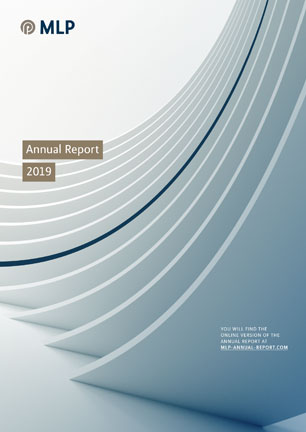ECONOMIC REPORT
Overall economic climate
Overall economic situation
The economy in the eurozone continued to display weaker growth in the reporting year. Weaker exports in an unfavourable international economic environment were the main negative factor. According to estimates provided by FERI Investment Research, economic growth for the eurozone was 1.1% in 2019 (2018: 1.9%).
German economy experiencing a downturn
The German economy is suffering from foreign trade pressures and, moreover, is in a structural crisis. Alongside known risk factors, such as the weakness of the global economy, trade disputes and the uncertainties associated with Brexit, more and more reports on job cuts, for example in the automotive industry and the financial sector, started appearing in the second half of the reporting year.
However, domestic demand remained positive, largely thanks to the high level of employment and increasing incomes. The sustained boom in the building sector and the healthy situation in the service sectors also had a stabilising effect. The economy was bolstered by private consumption in the reporting year. According to calculations performed by FERI, inflation-adjusted gross domestic product (GDP) in Germany was only 0.6% above the previous year in 2019.
Consumer confidence in Germany coming under slight pressure
The mood among consumers in Germany darkened somewhat in the reporting year due to the aforementioned factors and crisis hotspots. The Consumer Sentiment Index of the German Consumer Research Association (GfK) was at 9.7 points in December 2019 – and thereby slightly below the previous year's high level (December 2018: 10.2 points).
Sentiment among German companies also began to deteriorate in the course of the reporting year. The ifo business climate index fell to just 95.0 points in November 2019 – having previously reached a level of 100.0 points in January 2019. Towards the end of the year, sentiment improved noticeably. In December 2019, the index rose to 96.3 points.
Economic headwind for the employment market
The rather stifled development of the German economy also weakened the positive employment market development in the last financial year. According to data published by Germany's Federal Employment Agency, however, the number of registered unemployed still fell by 73,000 to 2.27 million persons in 2019 compared to the previous year. This corresponds to an unemployment rate of 5.0% (2018: 5.2%).
According to estimates provided by the Institute for Employment Research of the German Federal Employment Agency (IAB), the number of those in gainful employment displayed a year-on-year average increase of 382,000 persons in 2019 to 45.2 million. This rise can primarily be attributed to an increase in employment subject to compulsory social security contributions, although this figure rose more slowly in the reporting year than in previous years.
The prospects for university graduates in the German employment market remain excellent. According to the latest data from Germany's Federal Employment Agency, the unemployment rate among university graduates was at its lowest value since German reunification at 2.2%. This indicates full employment.
Salaries and wages still rising
In 2019, private households in Germany benefited from a labour market situation that remained solid, as well as rising incomes. According to data published by the "Tax Estimates" workgroup, gross wages and salaries increased by 4.1% in the reporting year, while the disposable income of private households increased by 2.7% according to the 2020 Financial Report of the German government. The savings rate in Germany in the last financial year was 10.9% - which is almost exactly the same as the previous year's level (2018: 11.0%).

